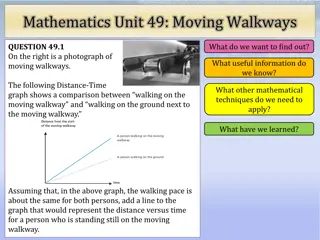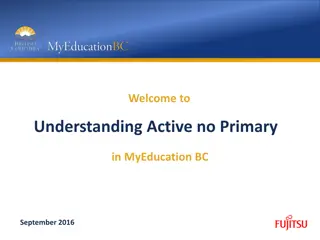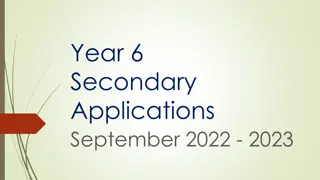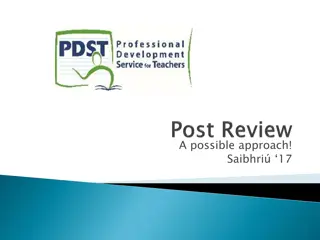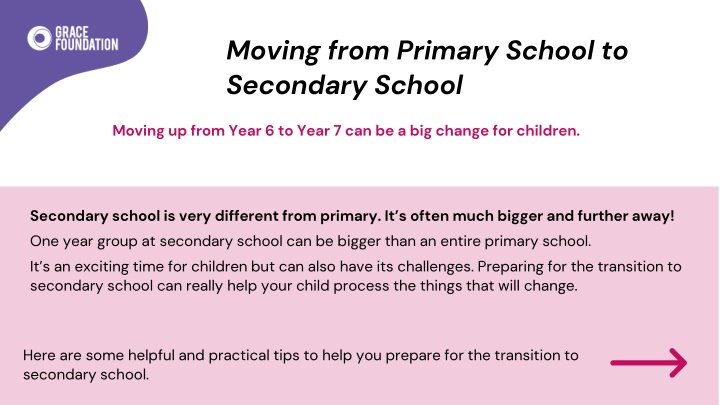
Helpful Tips for Transitioning to Secondary School
Moving from primary to secondary school can be a big change for children. Learn about choosing the right school, applying for a place, preparing for the transition, and more with these practical tips.
Download Presentation

Please find below an Image/Link to download the presentation.
The content on the website is provided AS IS for your information and personal use only. It may not be sold, licensed, or shared on other websites without obtaining consent from the author. If you encounter any issues during the download, it is possible that the publisher has removed the file from their server.
You are allowed to download the files provided on this website for personal or commercial use, subject to the condition that they are used lawfully. All files are the property of their respective owners.
The content on the website is provided AS IS for your information and personal use only. It may not be sold, licensed, or shared on other websites without obtaining consent from the author.
E N D
Presentation Transcript
Moving from Primary School to Secondary School Moving up from Year 6 to Year 7 can be a big change for children. Secondary school is very different from primary. It s often much bigger and further away! One year group at secondary school can be bigger than an entire primary school. It s an exciting time for children but can also have its challenges. Preparing for the transition to secondary school can really help your child process the things that will change. Here are some helpful and practical tips to help you prepare for the transition to secondary school.
Choosing a Secondary School In some areas of the UK there will be lots of choice of secondary schools, in other parts there may only be one school nearby. Make sure you ve got a good chance of getting a place Lots of choice is great, but make sure you look at admissions policies and think about catchment areas. Don t waste your first choice on a school that you are too far away from to get in. Read OFSTED reports and look at the school results online. The school website will have details of these or, you can search school results at https://www.compare-school-performance.service.gov.uk/ Visit the school and talk to parents whose children attend The best thing to do is visit the school during their open evening, or if this doesn t work arrange a tour during the day time. It s useful talking to other parents but remember each child is different and different schools will suit different children.
Applying for a place Don t miss the deadline! All applications are now made online, your primary school should remind you when the deadline is coming up! You must put a first and second choice so even if you have a firm favourite it might be worth visiting a second school. If you re not happy with the school choice in your area reach out to your local authority school admissions service. You can appeal the decision for a school place, however these are regularly unsuccessful.
Preparation, Preparation, Preparation Once you ve had your secondary school place confirmed it s time to start preparing for the big move. Take time to say goodbye Most primary schools have a series of events to help the students say goodbye to their primary school. Celebrate all they have achieved and reflecting on how much they ve grown can really help children process the grief that they might feel at leaving their primary school. Find out as much as you can about the new school Make every effort to visit the secondary school ahead of September. There should be open evenings, events and transition days in the summer term. Becoming as familiar as possible with the new school will really help prepare for the transition. Independence The move to secondary school brings a new level of independence for children. Try to encourage this through year 6 and the summer.
Uniform Budget Uniform at a new school can be a big expense. Make sure you budget for this and source your uniform ahead of time. If you re struggling with the cost ask the school about what good quality, second hand uniform they have available for a reduced price. Familiarity Make sure you and your child are familiar with the uniform policy. This will help you choosing coats, bags and school shoes. It s also worth noting if they will have to wear a tie, it s a good idea to practice tying one before the first day! Other considerations If you have a daughter starting secondary school, it s worth considering whether it would be useful for them to have some spare uniform in their bag. If there is a possibility that they will start their period, it will help to be prepared. Schools provide sanitary items to students free of charge.
Orientation Getting to school Make sure you re child is familiar with the journey to school. Are they getting public transport? The school bus? Walking? If possible it s a good idea to practice the journey before their first day. This will help make sure they get their safely and on time. Getting around school Secondary schools can seem like a maze to new students! Ask for a map at the open evening or transition days. Most schools will do some orientation activities to help new students learn their way around. Children don t need to worry about asking for help if they get lost, everyone is in the same boat and they all learn their way eventually. Other considerations If your child is particularly anxious about certain things during the day it might be worth making sure they know where they can go for help. If you are attending a Grace Foundation Partner School, finding the Ethos room is helpful as you know you have somewhere you can go during break or lunch or if you just need someone to talk to.
Making new friends Making new friends is an exciting part of starting a new school, however, many young people can face anxiety at the start of term, especially if they don t know anyone in their classes. - Try and support your child with taking every opportunity to make new friends. - Find out what activities the school provides to help your young person meet new people. Is there a lunch time, drop-in, or after school club they could attend? - Some schools hold a 1s and 2s event for students who are the only ones moving up from their primary. This is a great opportunity to meet other children who are in the same position. - Making friends takes time, try not to worry if it doesn t happen immediately. - Don t panic if your child isn t with anyone that they know in their tutor group. Tutor groups are only together for a small part of the day. - Ask for support from the school if your child is struggling with making friends or you are worried about them.
Staying Calm If you or your child are struggling with the move up to secondary school, you are not alone. Any major change or transition in life can be hard to navigate. We ve got more information on how to look after your mental health in the mental health and well- being section of the Grace Foundation Family Hub.









